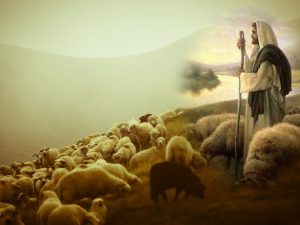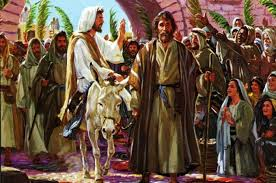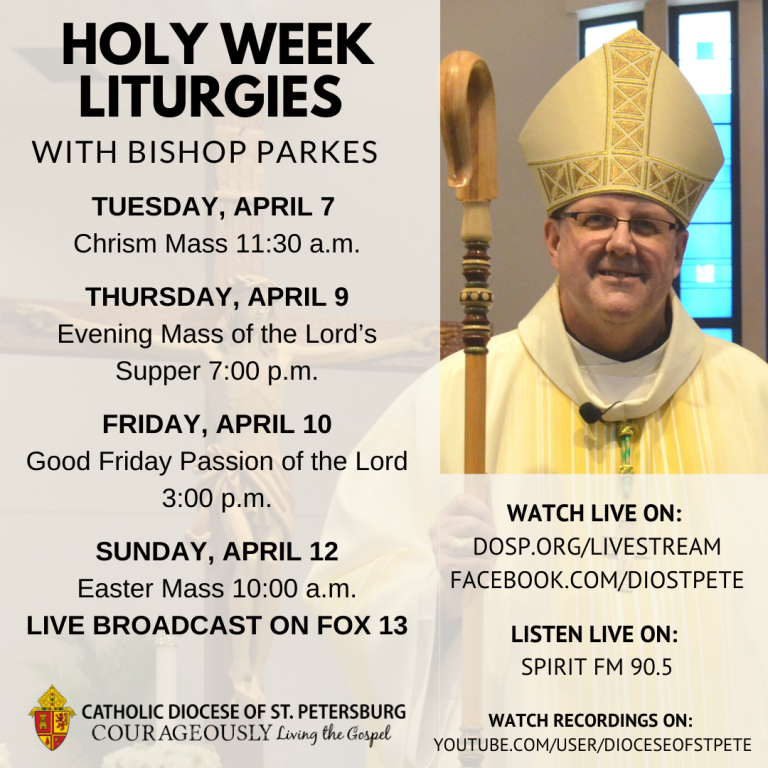Jesus the Good Shepherd
 No wonder this is called Good Shepherd Sunday and the church’s day of prayer for vocations. Jesus’ identification as the good shepherd is read in all three cycles of Sunday Gospels. Jesus says: “I am the good shepherd. I know my own and my own know me!” One of the earliest paintings of Christ in the Roman catacombs represents him as carrying an injured sheep on his shoulders. It was, and remains, an endearing and intimate image of a loving relationship – nurturing, life-giving, transforming, empowering.
No wonder this is called Good Shepherd Sunday and the church’s day of prayer for vocations. Jesus’ identification as the good shepherd is read in all three cycles of Sunday Gospels. Jesus says: “I am the good shepherd. I know my own and my own know me!” One of the earliest paintings of Christ in the Roman catacombs represents him as carrying an injured sheep on his shoulders. It was, and remains, an endearing and intimate image of a loving relationship – nurturing, life-giving, transforming, empowering.
The image of the Good Shepherd seems to be a favorite of Pope Francis. One that he not only speaks about but a likeness he models for clergy and laity alike. His actions enflesh his message of equality and God’s sacred gift of dignity. The message of the COVID pandemic is similar: we’re all in this together. No one is exempt or privileged. We are as strong as our weakest link; only as safe as the person who is the least restrictive in contacts. Pope Francis shows us how to “walk the talk.” For him and all “good” shepherds, it is never simply part of their job. Love-in-action is integral to their self-identity.
And I wonder aloud: why did Jesus choose SHEEP for his parable? There are other animals native to the land where he spent his childhood: sand cats, camels, “man’s best friend,” or perhaps a goat or, heaven forbid, a pole cat. Actually there are 116 mammal species native to the Middle East. What we do know is that he probably saw sheep most days of his life. And, He was teaching a lesson that would live LONG after He walked the face of this earth. I can’t pretend or presume to read the mind of God. But, Jesus, being God, knew that sheep would still be around today so that we 21st century people, living on the other side of the world, could identify with his example.
What is it about sheep that gives us some insight into our relationship with Jesus, the Good Shepherd? I’ll describe a few. Shepherds must anticipate the needs of their sheep for food, water, sleep, leadership and protection. Sheep are commonly described as lacking initiative, dependent, copycats but simple and playful. They have insatiable appetites. They seek sustenance, suckling from the moment they can stand upright. Sheep are skittish especially of loud noises and unpredictable in their reactions. Maybe it’s their strong flocking instinct that most aptly applies to us who seek relationships in religious life? Sheep are very social and need to see one another when grazing. (Is that why we sit across from each other in chapel and at table?)
few. Shepherds must anticipate the needs of their sheep for food, water, sleep, leadership and protection. Sheep are commonly described as lacking initiative, dependent, copycats but simple and playful. They have insatiable appetites. They seek sustenance, suckling from the moment they can stand upright. Sheep are skittish especially of loud noises and unpredictable in their reactions. Maybe it’s their strong flocking instinct that most aptly applies to us who seek relationships in religious life? Sheep are very social and need to see one another when grazing. (Is that why we sit across from each other in chapel and at table?)
Sheep are agitated if separated from the flock. (Like humans who are forced to practice “social distancing.”) Sheep have excellent eyesight with their large, somewhat rectangular eyes, giving them a wide field of vision. (Like high Sensates who take in every visual detail.) This feature, and a good sense of smell, alerts them to predators. (Like dogs trained to smell out drugs and now COVID 19.) Sheep are stubborn and unpredictable. (Sound like anyone you know?) Head butting is both a natural and a learned behavior in sheep. (And, face it, some people are skilled in this behavior – butting heads over trivial details.)
You see, we all act like sheep on occasion. We often ramble off from the flock to nibble at little bits of foreign pasture. However, we have a Shepherd who understands us; one whose patience and love are infinite. He is always ready to go after us when we stray afar. His voice is constantly reaching out to us in Lectio, retreats, sicknesses, crosses, this pandemic and other various ways. How many times have we already felt his loving grace calling and helping us back to the safety of his fold? Some of us may have even felt His shepherd’s crook around our neck, gently coaxing us back into the flock!
This Good Shepherd sermon preached by our Savior over two thousand years ago is still echoing and re-echoing around the world, calling on us, his faithful flock, to do all in our power to spread his Kingdom. Do not shut your ears to this call of Christ today. Give him a helping hand by sharing the light of your faith, praying for and nurturing vocations. And, ponder which sheep-like traits is Jesus coaxing to life in you? Which could do with a little taming down.
~Reflection by Sister Roberta Bailey, OSB, Prioress
First Reading Acts of the Apostles 4:8-12 Second Reading 1 John 3:1-2
Gospel John 10:11-18 Intention: 2015 Graduates
Continue ReadingA Reflection from Easter Season 2018
On this third Sunday of Easter, we continue to hear Gospel accounts of Jesus’ appearances following his Resurrection. In each account Jesus greets his disciples with the words, “Peace be with you.” Peace is their most obvious and pressing need. They have witnessed the death of someone they dearly loved.
Here is this account, two of the disciples recount a touching story of PEACE invading their lives. They were taking a Sunday stroll – well, a seven-mile walk – chatting about the events of the last several days. Suddenly a stranger slips into their midst. Now, the Jewish custom of the day required that they invite the stranger to join them for a meal. In this case, the invitation included an overnight’s rest. Later they realized Who had broken bread in their company. Can’t you see Jesus’ smiling to himself in delight in picturing his friends’ sudden realization who they had been talking with!? Now this friends realized that their hearts had been afire as they listened to him break open the Scriptures with him. What a Lectio experience!
We believe God is all around us: God is in nature, God is here with you and me now. But do we really believe that God – in the person of Jesus – will drop into our company and chat with us? That every person manifests a virtue of Jesus that I need in my life. One may be the patience of Christ, another the spirit of helpfulness, or a positive attitude, the ability to turn strangers into friends, a secret friend that does your daily chore, a soothing voice, a listening ear. Look around the room: where do you see Jesus looking back at you. How interesting that we all see the faces but each one sees the very virtue she needs to make her life whole. And, how puzzling it can be when two people share an experience, know the same person, were there when “it” happened but have two distinct, often opposite, memories.
You know what it’s like, many years after childhood, at family gatherings,… your siblings’ memory of particular event can be worlds apart. And, what about community memories! I once heard Sister Helen talk about something that happened to her … I feel certain that was MY experience.
Let me tell you about an event that happened on a Sunday afternoon many Springs ago. Kevin was walking home through the park after having attended Sunday Mass and CCD class. He stopped to pluck a flower for his mom and watched a butterfly flit from plant to plant…. He stood quietly watching a woodpecker drill a hole in a tree. All the while, he couldn’t stop thinking about the Bible lesson for that day. What impressed him the most was when the teacher said, “You will find the risen Jesus in every one you meet.”
 As he continued through the park, he noticed an old woman sitting on a bench. She looked lonely and hungry. So he sat down next to her, took out the coveted chocolate bar he had been saving. He offered some to the lady who accepted it with a beautiful smile. They sat together in silence, for a long time, just smiling at each other. As Kevin was leaving, he had gone but a short distance when he ran back to the bench, and gave the woman a big hug.
As he continued through the park, he noticed an old woman sitting on a bench. She looked lonely and hungry. So he sat down next to her, took out the coveted chocolate bar he had been saving. He offered some to the lady who accepted it with a beautiful smile. They sat together in silence, for a long time, just smiling at each other. As Kevin was leaving, he had gone but a short distance when he ran back to the bench, and gave the woman a big hug.
When he arrived home, his mother asked, “What’s making you smile so happily today?” (He said,) “I shared my chocolate bar with Jesus. You know, he has the most beautiful smile in the world.”
Meanwhile, the old woman returned to the little apartment where she lived with her sister. Her sister remarked, “You seem really happy today. “I am, I’ve been in the park. Jesus shared his chocolate bar with me. And, you know, he looks a lot younger than I expected.”
That’s the lesson in today’s gospel – we will meet and experience the risen Jesus in unexpected places and persons. Our only expectation can be “He will show up!”
Pooh and Piglet were taking their evening walk. For a long time they walked in the kind of silence good friends share. Finally, Piglet asks, “When you wake up in the morning, Pooh, what’s the first thing you say to yourself?” “What’s for breakfast? And what do you say, Piglet?” “I say, I wonder what exciting thing is going to happen to me today?”
When or where will we meet the Risen Christ today. What we know is that He will show up. Take delight in his revelation! In the words of our Responsorial Psalm: “Know that the Lord does wonders for his faithful ones. God puts gladness into my heart.”
What virtue of Jesus do you see reflected back to you in person of the persons you meet?
Have a good week. We long for the day we can share a hug … here’s a virtual hug for you …. Stay safe …
~Reflection by Sister Roberta Bailey, OSB, Prioress
First Reading Acts of the Apostles 3:13-15,17-19 Second Reading 1 John 2:1-5a
Gospel Luke 24:35-48
Continue ReadingVigil of Palm Sunday 2020
 Thomas Moore, a contemporary author and lecturer wrote: “The whole point of a good story is to give birth to other stories and to deepen reflection.” The Palm Sunday stories certainly call us to reflection. There are stories within stories that bring to mind more stories. A temptation may be to try to reflect on too many of the stories. In Lectio we can become absorbed in the complex harmonies, tempos and textures of the words. Or as LCWR terms it: we can become servants to the narratives of the materials at hand. But, this takes uninterrupted time. It seems a good choice for the Palm Sunday stories to simply “sit with” the story.
Thomas Moore, a contemporary author and lecturer wrote: “The whole point of a good story is to give birth to other stories and to deepen reflection.” The Palm Sunday stories certainly call us to reflection. There are stories within stories that bring to mind more stories. A temptation may be to try to reflect on too many of the stories. In Lectio we can become absorbed in the complex harmonies, tempos and textures of the words. Or as LCWR terms it: we can become servants to the narratives of the materials at hand. But, this takes uninterrupted time. It seems a good choice for the Palm Sunday stories to simply “sit with” the story.
Palm Sunday liturgy is potpourri of themes and a roller-coaster of emotions: high hosannas, a supper with friends, an example of loving humility, washing of feet and later washing of hands; betrayal and mocking, Simon and Veronica, John and Mary, Joseph and the women – their expressions of care, courage and compassion – the soldier’s “Surely this was an innocent man,” the donation of a burial place, preparation of the body of a loved-one, the watching at the empty tomb and the waiting … and waiting … and waiting.
In times not like the current pandemic, Palm Sunday services would begin similar to the first Palm Sunday, with such glorious solemnity … waving palms, processions, joyful singing of hosanna! Sadly, within about an hour’s time symbolically we travel from cries of “Blessed is He who comes in the name of God!” to shouts of “Away with this man – Crucify him!” Then, in our liturgy we move on to the Eucharistic acclamation: “Christ has died, Christ is risen, Christ will come again!” We pray for forgiveness and daily bread. We acknowledge each other in a gesture conveying God’s own peace. We recall Jesus’ supreme sacrifice and take (normally) into ourselves His body and blood. Afterward, the communion antiphon calls us back to the beginning of the story – to the thread that winds through the whole story: “Father, if you are willing, take this cup away from me: still, not my will but yours be done.”
This same sentiment is echoed in the prayer often used at the Stations of the Cross: “Oh, my God, I love you. I love more than myself. Grant that I may love you always, then do with me what you will.” When I hand myself over to God, as Jesus did, in a sincere act of self-surrender, “Suscipe me” – I am asking God to accept me just as I am now – open, vulnerable, powerless against the forces of the pandemic. I am also saying that I am willing to receive whatever God has in store for me. The journey moves onward, to future Palm Sundays and Good Fridays. Our empty churches and chapels this year are a strong reminder of the “empty tomb.” We may lament Jesus’ Eucharistic absence in our lives. At the same time, we take comfort knowing that we can feel God’s very real presence in our lives through the witness of prayerful lives and care and concern for each other.
Easter will come! God will win the day! It will simply be different and very personal. We feel connected with all who are enduring the same deprivations of social distancing. “Accept me, accept us, O God, as you have promised and I shall live – we shall live; and we shall not be disappointed in our hope.”









